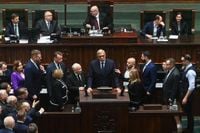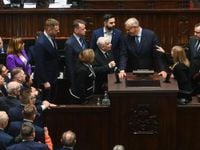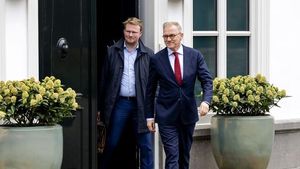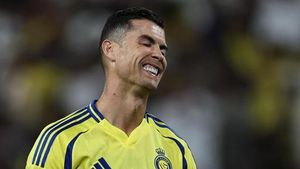In a dramatic confrontation in the Polish Sejm on April 2, 2025, tensions flared between Jaroslaw Kaczynski, the President of the Law and Justice Party (PiS), and Civic Coalition MP Roman Giertych. The verbal clash erupted during a session where Kaczynski accused Giertych of being the "main sadist" in the country, a comment that sparked outrage and further escalated the situation.
The conflict arose as Kaczynski addressed the death of his colleague Barbara Skrzypek, who died shortly after being questioned by prosecutors. During his speech, Kaczynski attempted to frame her death as a political weapon against the PiS, labeling her a "victim of the regime." Giertych, however, countered this narrative, stating that Kaczynski's aggressive demeanor during the session revealed the PiS's fear surrounding the ongoing investigation into the so-called "two towers" scandal.
Giertych remarked on TVN24, "What happened today shows that Jaroslaw Kaczynski and the entire PiS camp are terrified by the matter of the two towers." He added that the situation has worsened significantly compared to three weeks prior, as the investigation into Kaczynski's alleged misuse of power to benefit a relative continues to unfold.
As the session progressed, Giertych confronted Kaczynski directly, asking him to refer to him as "uncle," a reference to their distant familial ties. This remark drew laughter from the assembly but also intensified Kaczynski's ire. The atmosphere grew increasingly hostile, with shouts of "get down, murderer" directed at Giertych from PiS members.
In response to Kaczynski's accusations, Giertych stated, "The Civic Coalition parliamentary club is filing notifications regarding the incident. I spoke as a deputy, as a public official. Such insults are punishable under Polish law, and those who behaved this way in parliament must face consequences." He described Kaczynski's conduct as "completely abnormal and aggressive," marking a significant departure from the decorum expected in the Sejm.
Giertych also expressed concerns over the implications of Kaczynski's statements regarding Skrzypek, asserting that Kaczynski's public declaration of having spoken to a witness about their testimony raises serious ethical questions. He stated, "How can a suspect publicly claim to have spoken with a witness regarding their testimony? This is tampering with evidence," emphasizing the gravity of the situation.
Moreover, Giertych revealed that he had requested an investigation into the phone logs of Barbara Skrzypek, suggesting that Kaczynski's interactions with her may have been more than coincidental. He speculated, "I think Kaczynski has a guilty conscience about what he said to Skrzypek after the interrogation," indicating that Kaczynski's behavior may be rooted in deeper anxieties regarding the unfolding investigation.
The confrontation has not only drawn attention within the political sphere but has also ignited public interest and debate. Michal Karnowski, a commentator, noted that such clashes are a part of democracy, although he criticized Giertych's approach, calling it a breach of basic cultural norms to address an elder in such a familiar manner.
Giertych's references to literary works, specifically his invocation of Henryk Sienkiewicz's "The Deluge," where characters discuss familial obligations, were intended to underscore the absurdity of their political rivalry. He remarked, "It was more of a jest, a parody, and I was referencing the context of being distantly related, as genealogists have shown. But the way Kaczynski reacted was unexpected and quite aggressive."
The incident has sparked a flurry of reactions on social media, with various political figures weighing in. Donald Tusk, the leader of the Civic Platform, and Radoslaw Sikorski, a prominent opposition figure, both commented on the altercation, highlighting the ongoing tensions within Polish politics.
As the dust settles from this extraordinary session, the implications of Kaczynski's and Giertych's words will likely resonate beyond the Sejm. The ongoing investigation into the "two towers" scandal, coupled with the tragic death of Skrzypek, continues to loom large over the PiS, raising questions about accountability and the integrity of Poland's political leadership.
In a country where political rivalries often spill into public view, this confrontation serves as a stark reminder of the high stakes involved. With both sides digging in their heels, the future of Polish politics appears increasingly fraught with tension.







